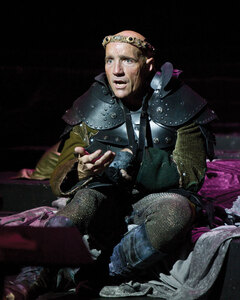‘Richard’ rests on character’s deformities
In truth, Shakespeare’s Richard III needs us far more than we need it. It is a play purely for the stage, not the classroom. Without an audience with which its titular villain can manufacture an all-important connection, the play is nothing but a poetic mess of political and literal backstabbing, a crude and unsubtle pageant of bloodshed that we could no doubt do without.
If, however, we are made to like Richard III, in spite of the unconscionable enormity of his villainy, watching the play becomes worthwhile and truly dramatic.

Blood thirsty · Steve Weingartner stars in A Noise Within’s Richard III. - Photo courtesy of A Noise Within
A Noise Within’s production of Richard III, which opens its 2009-2010 season, stages the play so as to maximize that connection. Steve Weingartner’s Richard III, who begins the play as Richard, Duke of Gloucester, is made to recite his opening soliloquy from a staircase in the audience as if he were one of us — a mere observer to the glorious events unfolding onstage. We see what he sees, if only for a moment. His words are infamously chilling.
Of course, the staging stops being effective once we realize that Richard is not really an observer and certainly not one of us, but the principal actor. Evil incarnate, Richard is man who would just as soon butcher children as eat his breakfast.
The entire play rests on Richard’s deformed shoulders, for the play really only concerns one man and his bloody ascent to power. Richard, brother of the ailing King Edward IV of England (Apollo Dukakis), starts off as seventh in line to the throne, but not for long. Once Edward dies, Richard offs everyone in his way — man, woman or child — in his quest for kingship. Of course, he mostly contracts out these murders and rarely bloodies his own hands.
Weingartner’s Richard is no revelation, nor is it standard. He is far more playful than we might expect, highlighting Richard’s cavalier attitude and sardonic wit to the ninth degree. The results are mixed. On the one hand, he is better able to form some kind of connection with the audience, but on the other, he dilutes his character, to the point that connection is rendered mostly ineffectual. Weingartner is merry in his evil, but perhaps too merry, which measurably reduces his stage presence. By making his villainy into comedy, he ensures that we won’t take him seriously as truly evil, but merely as a caricatural representation thereof and someone who could never possibly exist outside the stage.
Richard risks audience alienation almost no matter what — which is not helped here by the sheer excess of his physical deformities (Richard should have a noticeable limp, but the useless arm with weirdly bandaged fingers and the hunchback and the deep scars on his face amount to overkill) — and Weingartner never quite masters the role. Regrettably, the production suffers for it, as Richard is its center. We do not connect with him as we should. In Richard, we see not the secret lust for power that inhabits some part of all our souls, but an evil clown of a villain whose death in the end is mostly a relief.
There to save the show from banality (and unfortunate comparisons to postmodern Hollywood fare) are a few valiant performances from the women, who consistently outperform their male counterparts. Their feat is made all the more impressive by the fact that some scholars — including our preeminent interpreter of Shakespeare, Harold Bloom — consider the women in Richard III unplayable. Indeed, Shakespeare was not generally kind to women in this play, making Lady Anne (a remarkable Lenne Klingaman) weak-minded and susceptible to Richard’s false charm. He woos her at the height of her misery, even though she knows he killed her husband and her father-in-law.
Susan Angelo’s widowed Queen Elizabeth deals with grief very capably and exudes regality. But it is Deborah Strang (a company mainstay) as the banished Queen Margaret who steals the show. Sometimes her part is excised to save time — Richard III is second only to Hamlet in length, and requires serious editing — but thankfully it was kept fully intact here. A witchlike prophetess of the impending doom, she hurls imprecations at a deaf royal family with delicious ease.
What doesn’t make the cut is the Duke of Clarence’s (an underutilized Bo Foxworth) dream speech, which is one of the most poetic passages from the play. Otherwise, the editing seems generally fluid, even if the references to past events in Shakespeare’s preceding histories can be confusing at times to those unfamiliar with Shakespeare’s version of English politics.
Along those lines, director Geoff Elliott was right to use the traditional setting of the play, the War of the Roses in England. Elliot’s direction in general is bold, but sometimes diminished by imprecise lighting. The fight scene at the end is fun, but never exactly thrilling, in part because Freddy Douglas is hard to buy as the valiant Richmond (his quavery intonation is better suited for more introspective characters, like last season’s Hamlet), and also because Richard’s deformities make his fighting style slightly comical.
But when the show ends, it ends; it doesn’t stay with you. Ultimately, this is only serviceable Shakespeare from a generally wonderful classical repertory company — nothing outrageous, but then, nothing revelatory. We might have hoped for outrageous.
